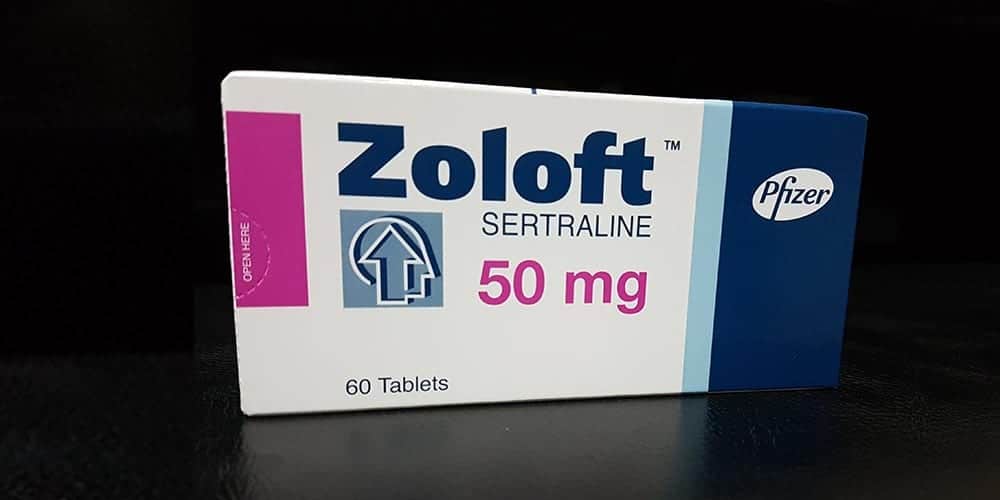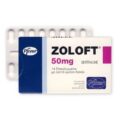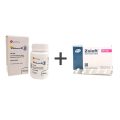Research suggests that antidepressants can be helpful for people with moderate or severe depression. Studies have shown that they’re better than placebo (“dummy medicine”) for people with these conditions. They’re not usually recommended for mild depression unless other treatments like therapy have not helped. The Royal College of Psychiatrists estimates that 50 to 65% of people treated with an antidepressant for depression will see an improvement, compared to 25 to 30% of those taking a placebo. Conditions affecting brain function contribute around 13 percent of the global burden of disease, with major depression expected to be the largest contributor to this by 2030.
What is Zoloft (Sertraline)?
Zoloft is a brand of Sertraline an antidepressant in a group of drugs called selective serotonin reuptake inhibitors (SSRIs). Sertraline affects chemicals in the brain that may be unbalanced in people with depression, panic, anxiety, or obsessive-compulsive symptoms. Sertraline is used to treat depression, obsessive-compulsive disorder, anxiety disorders (including panic disorder and social anxiety disorder), post-traumatic stress disorder (PTSD), and premenstrual dysphoric disorder (PMDD).
Important information
You should not use sertraline if you also take pimozide, or if you are being treated with methylene blue injection.
Do not use sertraline if you have used an MAO inhibitor in the past 14 days, such as isocarboxazid, linezolid, methylene blue injection, phenelzine, rasagiline, selegiline, or tranylcypromine.
Some children and young adults have thoughts about suicide when first taking an antidepressant. Stay alert to changes in your mood or symptoms. Report any new or worsening symptoms to your doctor.
Seek medical attention right away if you have symptoms of serotonin syndrome, such as agitation, hallucinations, fever, sweating, shivering, fast heart rate, muscle stiffness, twitching, loss of coordination, nausea, vomiting, or diarrhea.
Before taking this medicine
You should not use sertraline if you are allergic to it. Do not use the liquid form of sertraline if you are taking disulfiram (Antabuse) or you could have a severe reaction to the disulfiram.
Do not take sertraline within 14 days before or 14 days after you take an MAO inhibitor or methylene blue injections. A dangerous drug interaction could occur. MAO inhibitors include isocarboxazid, linezolid, phenelzine, rasagiline, selegiline, and tranylcypromine. Do not take sertraline with pimozide.
To make sure sertraline is safe for you, tell your doctor if you have ever had:
- heart disease, high blood pressure, or a stroke;
- liver or kidney disease;
- a seizure;
- bleeding problems, or if you take warfarin (Coumadin, Jantoven);
- bipolar disorder (manic depression); or
- low levels of sodium in your blood.
Some medicines can interact with sertraline and cause a serious condition called serotonin syndrome. Be sure your doctor knows if you also take stimulant medicine, opioid medicine, herbal products, other antidepressants, or medicine for mental illness, Parkinson’s disease, migraine headaches, serious infections, or prevention of nausea and vomiting. Ask your doctor before making any changes in how or when you take your medications.
Some children and young adults have thoughts about suicide when first taking an antidepressant. Your doctor should check your progress at regular visits. Your family or other caregivers should also be alert to changes in your mood or symptoms.
Taking an SSRI antidepressant during pregnancy may cause serious lung problems or other complications in the baby. However, you may have a relapse of depression if you stop taking your antidepressant. Tell your doctor right away if you become pregnant. Do not start or stop taking sertraline during pregnancy without your doctor’s advice.
It is not known whether sertraline passes into breast milk or if it could harm a nursing baby. Tell your doctor if you are breastfeeding a baby.
Do not give sertraline to anyone younger than 18 years old without the advice of a doctor. Sertraline is FDA-approved for children with obsessive-compulsive disorder (OCD). It is not approved for treating depression in children.
How should I take sertraline?
Take sertraline exactly as prescribed by your doctor. Follow all directions on your prescription label. Your doctor may occasionally change your dose. Do not take this medicine in larger or smaller amounts or for longer than recommended. Sertraline may be taken with or without food. Try to take the medicine at the same time each day.
The liquid (oral concentrate) form of sertraline must be diluted before you take it. To be sure you get the correct dose, measure the liquid with the medicine dropper provided. Mix the dose with 4 ounces (one-half cup) of water, ginger ale, lemon/lime soda, lemonade, or orange juice. Do not use any other liquids to dilute the medicine. Stir this mixture and drink all of it right away. To make sure you get the entire dose, add a little more water to the same glass, swirl gently, and drink right away.
Sertraline can cause you to have a false positive drug screening test. If you provide a urine sample for drug screening, tell the laboratory staff that you are taking sertraline.
It may take up to 4 weeks before your symptoms improve. Keep using the medication as directed and tell your doctor if your symptoms do not improve.
Do not stop using sertraline suddenly, or you could have unpleasant withdrawal symptoms. Ask your doctor how to safely stop using sertraline.
How long does it take for Zoloft (Sertraline) to work?
Following oral once-daily dosing over the range of 50 to 200 mg for 14 days, mean peak plasma concentrations (Cmax) of sertraline occurred between 4.5 to 8.4 hours post-dosing. The average terminal elimination half-life of plasma sertraline is about 26 hours. You may see an improvement in your symptoms after a week or two, although it usually takes between 4 to 6 weeks before you feel the full benefits. That’s because it takes around a week for sertraline levels to build up in your body, and then a few weeks longer for your body to adapt and get used to it.
What happens if I miss a dose?
Take the missed dose as soon as you remember. Skip the missed dose if it is almost time for your next scheduled dose. Do not take extra medicine to make up for the missed dose.
What happens if I overdose?
Seek emergency medical attention or call the Poison Help line
What should I avoid while taking sertraline?
Do not drink alcohol.
Ask your doctor before taking a nonsteroidal anti-inflammatory drug (NSAID) for pain, arthritis, fever, or swelling. This includes aspirin, ibuprofen (Advil, Motrin), naproxen (Aleve), celecoxib (Celebrex), diclofenac, indomethacin, meloxicam, and others. Using an NSAID with sertraline may cause you to bruise or bleed easily.
Sertraline may impair your thinking or reactions. Be careful if you drive or do anything that requires you to be alert.
Sertraline side effects
Get emergency medical help if you have signs of an allergic reaction to sertraline: skin rash or hives (with or without fever or joint pain); difficulty breathing; swelling of your face, lips, tongue, or throat.
Report any new or worsening symptoms to your doctor, such as mood or behavior changes, anxiety, panic attacks, trouble sleeping, or if you feel impulsive, irritable, agitated, hostile, aggressive, restless, hyperactive (mentally or physically), more depressed, or have thoughts about suicide or hurting yourself.
Call your doctor at once if you have:
- a seizure (convulsions);
- blurred vision, tunnel vision, eye pain, or swelling;
- headache, confusion, memory problems, severe weakness, feeling unsteady (symptoms of low levels of sodium in the body); or
- racing thoughts, increased energy, unusual risk-taking behavior, extreme happiness, being irritable or talkative.
Seek medical attention right away if you have symptoms of serotonin syndrome, such as agitation, hallucinations, fever, sweating, shivering, fast heart rate, muscle stiffness, twitching, loss of coordination, nausea, vomiting, or diarrhea. SEE: 10 Differences and Similarities Between Zoloft vs Xanax
Common sertraline side effects may include:
- drowsiness or tiredness;
- insomnia or agitation;
- indigestion, nausea, diarrhea, loss of appetite;
- sweating;
- tremors or shaking;
- sleep problems (insomnia); or
- decreased sex drive, impotence, or difficulty having an orgasm.
This is not a complete list of side effects and others may occur. Call your doctor for medical advice about side effects. You may report side effects to FDA at 1-800-FDA-1088.
What other drugs will affect sertraline?
Taking sertraline with other drugs that make you sleepy can worsen this effect. Ask your doctor before taking a sleeping pill, narcotic medication, muscle relaxer, or medicine for anxiety, depression, or seizures.
Other drugs may interact with sertraline, including prescription and over-the-counter medicines, vitamins, and herbal products. Tell your doctor about all your current medicines and any medicine you start or stop using.
Keep this and all other medicines out of the reach of children, never share your medicines with others and use sertraline only for the indication prescribed.
Always consult your healthcare provider to ensure the information displayed on this page applies to your personal circumstances. SEE: How Long Does It Take For Gabapentin To Kick In





